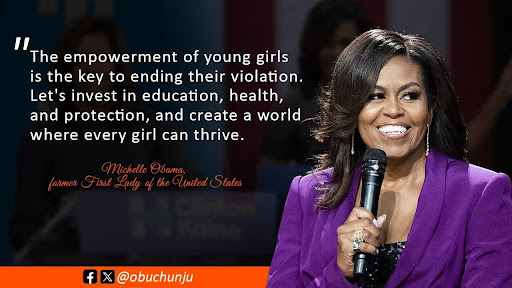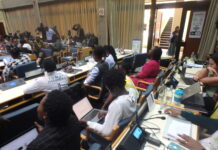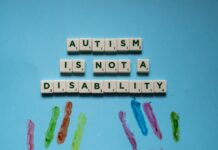By Henix Obuchunju
Nairobi, Kenya: In the confines of the densely Katwekera village located in Kenya’s Kibra informal settlement, the stark contrast between joy and despair is palpable.
Here, resilience and hope coexist with the daily struggles endured by its marginalized inhabitants. Mary (Not her real name) is not a stranger to many at Dorm Pub which accommodates approximately one hundred people on a bad business day.
Amidst the tin-roofed houses and narrow alleyways, Dorm Pub, a local joint, serves as a temporary refuge for both young and old, where men and women gather to water their throats. However, hidden in the midst of the revelers are underage girls forced to engage in prostitution for pads and food.
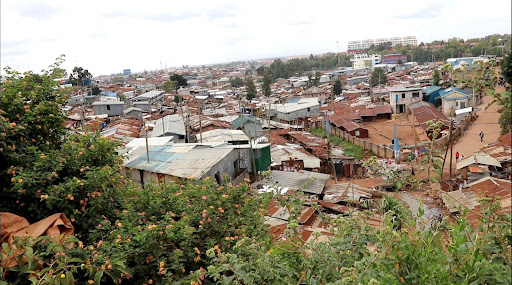
In their cramped room in Soweto village, the grandmother tenderly holds Mary’s sleepy toddler, their bodies nestled on a worn-out mattress that dominates the space. There are no chairs, only an old stool for visitors seeking a brief respite. Through the cracks in the walls, flickering images from the neighbor’s television offer a glimpse of the outside world. It’s a room marked by scarcity, where the lack of food pushes Mary, the young mother, to desperate measures.
To survive, Mary, the form One dropout, resorts to the sex trade, trading her body to make ends meet. Within these challenging circumstances, the room becomes a stark reminder of their struggles and a testament to the enduring love that binds this resilient family together.
Mary, who stays with her grandmother, dropped out of school due to early pregnancy. Her grandmother says it is common for the teen mother to spend nights at the Dorm Pub, leaving the toddler with her (the grandmother).
The teenage mother lacks knowledge of her age or parental background and partially depends on her grandmother for support. The burden of motherhood at a tender age has taken a heavy toll on her, evident in how she expresses herself.
“The thought of dropping out of school and poverty back at home makes me wonder what is left for me in this life,” Says Mary, insisting that she has found solace at a local drinking pub as her problems ‘disappear’ when she is drunk.
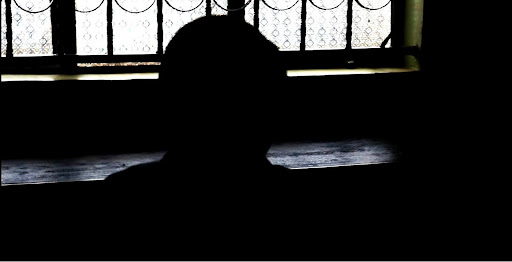
Mary’s age remains uncertain, as she initially claimed to be 19 but later revealed she dropped out of school in form one. In Kenya, a form one student is between 13 and 15 years old.
In Kenya, over 110,000 pregnancies were recorded among girls aged 10 to 19 in the first five months of 2023. This information comes from the Kenya Health Information Systems, and there are approximately six million adolescent girls in the country, according to data from the census held in 2019.
Of the pregnancies, 6,110 were among adolescents aged between 10 and 14 years, while another 104,711 were between the ages of 15 and 19. These statistics are almost half of the incidents recorded in 2022, which stood at 260,734 teen pregnancies, compared to 316,187 in 2021 and 331,549 in 2020, respectively.
Seventeen-year-old Abigael (not her real name), also a resident of Kibra, admitted to having been recruited into prostitution by friends. She dropped out of school at Form Three.
“My mum died, and I had to take care of our family of six children. My classmates told me there were “cheaper” ways of getting money,” she said.
Abigael says one day, she sat at a pub’s entrance in Katwekera with her friends who ‘went away’ with men for a few minutes and returned with money.
“I was not lucky that day, and I left without a single cent. But my friends shared their earnings with me. It looked interesting and easy, and I went back the following day and got clients,” she says.
A few meters from Abigael, Susan (identity hidden), a 16-year-old girl familiar with Dorm Pub, has mastered the art of balancing her presence at the pub and attending school every day.
Susan says her background and the responsibility of caring for her siblings have forced her to resort to extreme measures for survival.
“I have five siblings who look up to me; my mother is a single mother doing domestic care jobs like washing clothes to feed us. It is hard for her to feed us all,” says Susan, adding she doesn’t remember the last time she asked for money from her mother to buy sanitary pads.
A former schoolmate who completed her education last year introduced Susan to the sex trade. The desperation she faces leaves her with limited options, ultimately subjecting her to exploitation.
“I know of others who are ashamed of coming out to speak to you, but this is what poverty has pushed us to; with the tough economic times, we must survive.”
Susan says she roughly heads home with between 300 and 500 shillings after spending a night at the pub. Her mother isn’t concerned about how she makes the money.
Edwin Otwori, the area chief, acknowledges the existence of such cases, stating, “Regrettably, these incidents occur within our community. It is a tragic reality we are actively working to address.” The involvement of local authorities is crucial in combating these issues and safeguarding the welfare of vulnerable girls in Kibera.
Otwori says prosecutions are few due to collaboration within the community.
“Everyone is profiting– the families’ money from the girls, the bars get customers because of the girls,” said Otwori.
“This acceptance means people don’t even see it as a crime, and the girls being oppressed do not see themselves as victims. So who will report the case?”
Said Otwori, insisting he is ready to rescue more girls should families and residents join his efforts.
A survey conducted by the Kenyan National Bureau of Statistics in 2022 unveiled a troubling reality: Kenya ranks third globally in terms of teen pregnancies. Shockingly, one out of every five adolescents aged 15-19 in Kenya is already a mother or is expecting their first child.
The narratives of these girls reflect the desperation they face, causing them to sacrifice their education and prospects to survive. The cycle of poverty perpetuates their vulnerability, leaving them with limited choices and subjecting them to exploitation, as suggested by a survey conducted by UNESCO detailing how poverty is fuelling these cases.
Zedekiah Olwenyi, a resident of Kibra for over ten years, echoes Otwori’s concerns about the complicity of the community with children involved in the sex trade.
“You know, I’ve seen something terrible in our neighborhood. It’s child prostitution, happening right under our noses. It’s organized, hidden away from prying eyes. It’s like a secret world that nobody talks about.” He sighed, his shoulders slumping with the weight of the truth he carried.
“We can’t stay silent anymore. We must find a way to bring attention to this issue and protect the vulnerable girls who are being robbed of their childhood.”
Another resident, Magdalene Iminza, describes the situation as heartbreaking. She has come to accept it as a normal part of life here. She is scared to speak up or do anything because she fears losing what little she has.
Efforts to contact Japheth Opondo, the owner of Dorm Pub, proved futile as he refused to respond to calls and messages when I contacted him.
Elizabeth Apondi, from Polycom Development Project, a non-governmental organization in Kibra, however, revealed how Polycom had intervened a few years ago to save girls from such exploitations by providing them with free pads.
“We realized that many girls were forced into compromising situations due to a lack of access to menstrual hygiene products,” Apondi explained. She further disclosed that Polycom has partnered with 50 schools in Kibra, ensuring that girls receive free pads to prevent instances of child exploitation through sex. However, Apondi expressed her wish to reach even more girls in Kibra with this vital support, lamenting the organization’s shortage of funds that hindered their efforts to expand their reach and impact.
Informal conversations with girls, off the record, revealed the deeply entrenched nature of this problem. They confidentially shared their knowledge and participation in the sex trade ring pointing out that there are areas within Kibra where girls are allowed to participate in sex trade activities. Their words painted a grim picture of the widespread presence of child exploitation and the urgent need for intervention. It became evident that the issue extended beyond the surface, permeating the very fabric of the community.
Through investigations, a woman named Jackeline Adhiambo, alias Jacky, resides in Katwekera and is allegedly responsible for recruiting girls in the Kamukunji area into child prostitution.
Multiple sources have accused her of luring vulnerable girls into this exploitative trade within Kibra. When approached for comment, Jackeline responded calmly, dismissing the issue with a casual remark of “Fanyeni Kile mnataka,” loosely translated as “Do what you want.”
According to the sources, Jackeline closely collaborates with pub owners in Katwekera, to trafficking girls through deceit by disguising the girls’ roles as bar attendants. Shockingly, some of these girls revealed that they do not receive payment for their work, leaving them no choice but to engage in sexual activities with the men who frequent these drinking establishments. An anonymous source revealed, “Come here on Friday and Saturday night, you will be shocked by how money exchanges hands here.”
At Dorm Pub, private rooms, famously known as lodgings, are fully booked during weekends. It is in these rooms that the girls are exploited.
“I used to be given between 800-1000 by any client. But the agreement was to give (her) Jackline 500 shillings which could cater for booking the rooms plus her allowances while the bar owner took 200 shillings,” Says a lady who used to be part of the group but left when well-wishers came to her rescue.
Kibra Police Commander promised to look into the matter when this evidence was presented to them.
The rates of teenage pregnancy in the country are a cause for concern, as they prevent girls from completing their education and limit their future opportunities. It is evident that urgent action is needed to provide comprehensive reproductive health education and support systems for adolescents in Kenya.
For Mary, it now only takes a night out with a man who approaches her at the pub to raise at least 200 shillings, which she will carry home to her aging grandmother and her little Angel.
“It was challenging even to afford a sanitary towel. I thank organizations for giving them (pads) freely to girls, but it became hard for me to survive without food,” Says Mary, urging well-wishers to consider supplying basic food to needy girls in Kibra.
Despite her current situation, Mary is hopeful that she will be able to get a better life if she acquires relevant trade skills that will make her self-reliant.
“I am passionate about hairdressing; if you can find me a place to train me on such, I will be grateful”, requested Mary.
